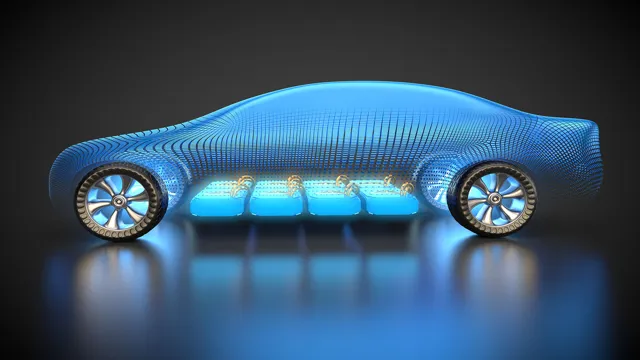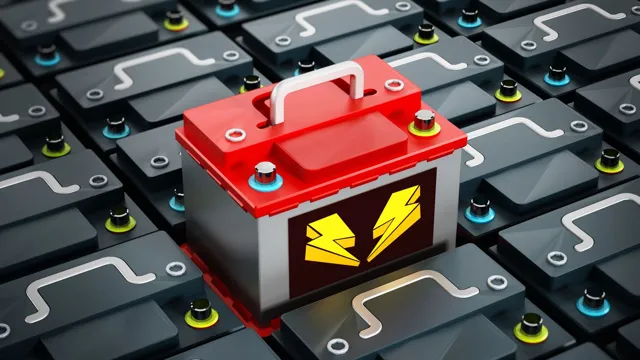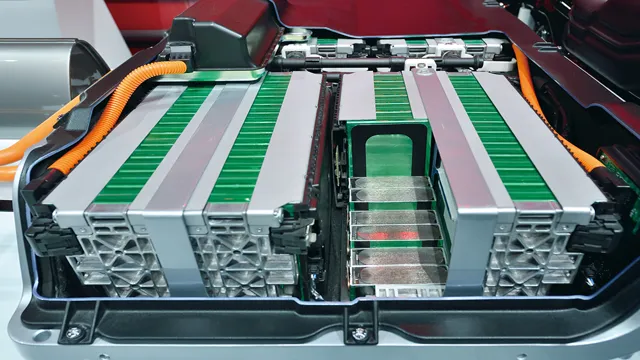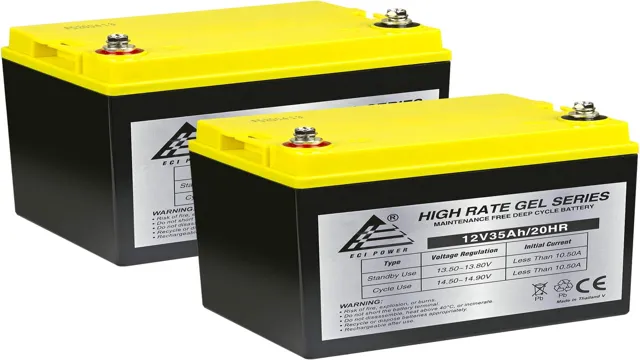The Comprehensive Guide to Understanding the Different Types of Batteries Used in Electric Cars
Electric cars are gradually taking over the automotive industry as more and more consumers switch to eco-friendly vehicles. With their reduced carbon footprint, electric cars have become a popular choice for those who want to contribute to environmental conservation efforts. However, these vehicles come with unique features that the conventional automobile does not possess, including the type of battery used to power the electric motor.
The power source of an electric car is the battery, but there are several different types of batteries used in these vehicles. Choosing the right type of battery depends on various factors, including cost, driving range, and charging time, which we will explore in this blog. So whether you are a seasoned electric car owner or just getting started, keep reading to learn more about the battery types used in electric cars.
Lead-Acid Batteries
When it comes to battery types used in electric cars, lead-acid batteries were once the go-to option. These batteries are known for their low cost and ability to provide high amounts of power, which makes them a popular choice for starter batteries in traditional combustion engine vehicles. However, lead-acid batteries have some significant downsides when used in electric cars.
For one, they are very heavy and bulky, making them impractical for use in smaller, lightweight electric vehicles. Additionally, lead-acid batteries tend to have a shorter lifespan and require frequent maintenance. As a result, many manufacturers have switched to newer battery technologies, such as lithium-ion batteries, which offer improved energy density and longer overall lifespans.
While lead-acid batteries may still have a place in certain applications, it’s clear that they are no longer the ideal choice for powering electric cars.
Description and Advantages
Lead-acid batteries are among the most common types of batteries used today. They are reliable, affordable, and easily available, making them a popular choice for a wide range of applications. These batteries are typically found in cars, boats, and other vehicles, as well as forklifts and other heavy-duty equipment.
They are also used in backup power systems, such as those found in hospitals and data centers. One of the main advantages of lead-acid batteries is their low cost. Compared to other types of batteries, they are relatively cheap to produce, making them a cost-effective solution for a range of applications.
They are also very durable, with a long lifespan that can last for several years. This makes them ideal for use in applications where reliability is key. Another advantage of lead-acid batteries is their ability to provide high levels of power.
They can deliver a lot of power in a short period of time, making them ideal for use in applications where a large amount of power is required, such as in starting a car engine. Overall, lead-acid batteries are a reliable, affordable, and versatile solution for a range of applications. Whether you need backup power for your home or reliable power for your vehicle, these batteries are an excellent choice.
So, if you’re looking for a reliable source of power, consider investing in a lead-acid battery.

Disadvantages
When it comes to lead-acid batteries, there are several disadvantages that can be a deal-breaker for certain applications. One of the most significant drawbacks is their weight and size, which can make them impractical for use in portable devices or vehicles where weight is a concern. Another drawback is their limited lifespan and the need for frequent maintenance, which can be time-consuming and costly.
Lead-acid batteries are also prone to self-discharge and have a lower energy density than other types of batteries, which can result in a shorter run time. Additionally, lead-acid batteries are not environmentally friendly and require proper disposal to prevent harm to the environment. While lead-acid batteries do have their advantages, it is crucial to consider their disadvantages before deciding which type of battery is best suited for a particular application.
Lithium-Ion Batteries
When it comes to battery types used in electric cars, Lithium-ion batteries are the most common choice due to their high energy density, low self-discharge rate, and long cycle life. These batteries use graphite as a negative electrode and a metal oxide as a positive electrode, with an electrolyte solution in between. Lithium-ion batteries are widely available, cost-effective, and have a high energy-to-weight ratio, making them the preferred choice for most electric vehicles (EVs).
However, they are not without drawbacks, such as high manufacturing costs and the risk of thermal runaway, which can cause fires and explosions. Nevertheless, manufacturers continue to improve the design and safety of these batteries, making them even more reliable and efficient for use in EVs.
Description and Advantages
Lithium-ion batteries are becoming increasingly popular in modern devices due to their many advantages over traditional battery types. These batteries use lithium ions to store and release energy, making them more efficient and longer-lasting than traditional alkaline batteries. They are lighter and smaller than other battery types, making them perfect for portable devices like smartphones and laptops.
Lithium-ion batteries also have a longer lifespan, allowing them to be used for years without needing to be replaced. Additionally, these batteries recharge faster and have a higher energy density, meaning they can hold more energy in a smaller size. These advantages make lithium-ion batteries the preferred choice for many consumers, and they are quickly becoming the standard in the electronics industry.
With their many benefits and versatile applications, it’s no wonder that lithium-ion batteries are quickly replacing older battery types.
Disadvantages
When it comes to Lithium-Ion batteries, there are certainly some downsides to consider. One of the biggest concerns with these batteries is their high cost compared to other types of batteries. Additionally, they have a limited lifespan, with most batteries typically only lasting a few years before needing to be replaced.
In some cases, Lithium-Ion batteries can also be prone to overheating and catching fire, which can be a major safety hazard. Another disadvantage to consider is that disposing of Lithium-Ion batteries can be difficult, as they contain toxic chemicals that can be harmful to the environment if not handled properly. Despite these drawbacks, Lithium-Ion batteries remain a popular choice due to their high energy density and ability to hold a charge for extended periods of time.
Nickel-Metal Hydride Batteries
When it comes to choosing the type of battery used in electric cars, there are a few options available. One popular choice is the Nickel-Metal Hydride (NiMH) battery. NiMH batteries have a higher energy density than traditional lead-acid batteries, which makes them a great choice for electric vehicles.
Additionally, they are rechargeable and have a longer lifespan than other types of batteries. NiMH batteries are also less likely to suffer from the “memory effect” that can occur with traditional rechargeable batteries, which means they can be recharged without needing to fully discharge first. While NiMH batteries may not be as common as Lithium-Ion batteries in electric cars, they are still popular among hybrid vehicles and are a reliable option for those looking for a longer-lasting, rechargeable battery.
So, if you’re interested in an electric car and wondering about the battery options, considering a Nickel-Metal Hydride battery may be a great choice!
Description and Advantages
Nickel-metal hydride batteries are rechargeable batteries that have become increasingly popular because of their ability to efficiently store and release energy. These batteries use a combination of nickel oxide hydroxide electrodes and metal hydride electrodes as an alternative to the more traditional nickel-cadmium batteries. The use of metal hydride electrodes makes them more environmentally friendly as they contain no toxic heavy metals, and are thus easier to dispose of.
Moreover, these batteries have a higher energy density than nickel-cadmium batteries making them more efficient and reducing the weight and size of the battery pack. Additionally, they have a longer life span than other types of rechargeable batteries, making them a cost-effective and reliable power source for various applications such as hybrid cars and portable electronic devices. With its green technology, efficiency, and lifespan, it is no wonder nickel-metal hydride batteries have become a popular choice for many industries.
Disadvantages
One of the disadvantages of Nickel-Metal Hydride batteries is their limited capacity and shorter lifespan compared to other battery types. They can only hold a limited amount of energy, making them unsuitable for high-powered applications. NiMH batteries also have a tendency to self-discharge, losing their charge over time even if not in use.
This is due to the fact that the hydrogen ions in the battery slowly break down the metal hydride, releasing hydrogen gas. Furthermore, Nickel-Metal Hydride batteries are sensitive to temperature changes and overcharging, which can cause them to overheat and become damaged. Overall, while NiMH batteries are a reliable and cost-effective option for low-powered devices, they may not be suitable for high-performance gadgets or applications.
Solid-State Batteries
One of the most important aspects of electric cars is their battery technology. There are several battery types used in electric cars such as lead-acid, nickel-metal hydride, and lithium-ion batteries. However, there is a new battery technology that has been making waves in the industry – the solid-state battery.
Compared to traditional lithium-ion batteries, solid-state batteries have higher energy density, faster charging times, and lower risk of fire due to their solid electrolyte. In addition, solid-state batteries are also more durable and can withstand extreme temperatures. This technology has the potential to revolutionize the industry and make electric cars more accessible and practical for everyday use.
As the demand for electric vehicles continues to grow, solid-state batteries may become the battery of choice for their superior performance and safety.
Description and Advantages
Solid-state batteries are being hailed as the future of energy storage technology. Unlike traditional lithium-ion batteries, solid-state batteries use solid electrolytes instead of liquid electrolytes. This makes them safer, more efficient, and more compact.
Solid-state batteries have several advantages over traditional lithium-ion batteries. For one, they don’t catch fire or explode in the same way that traditional batteries can. They are also more energy-dense, which means they can store more power in a smaller space.
Additionally, solid-state batteries have a longer lifespan than traditional batteries, which reduces waste and makes them more cost-effective in the long run. With all these benefits, it’s no surprise that solid-state batteries are quickly gaining popularity in the technology industry. As we continue to push for smaller, more efficient devices and more sustainable energy storage solutions, solid-state batteries are sure to play a big role.
Conclusion
In the ever-evolving world of electric cars, the choices for battery types can be overwhelming. From the traditional lead-acid batteries to the newer lithium-ion batteries, each type has its pros and cons. But fear not, fellow eco-conscious drivers, for the perfect battery type exists for every car and every lifestyle.
So whether you’re cruising down the highway or heading out on a road trip, your electric car’s battery has got your back. After all, it’s not just a car battery, it’s a symbol of progress and a step towards a brighter (and greener) future.”
FAQs
What are the different types of batteries used in electric cars?
The most common types of batteries used in electric cars include lithium-ion, nickel-metal hydride, and lead-acid batteries.
How long do the batteries in electric cars typically last?
The lifespan of batteries in electric cars varies depending on factors such as usage, charging habits, and environmental conditions. However, most batteries are expected to last around 8-10 years or around 100,000 miles.
Can you charge an electric car with a regular power outlet at home?
Yes, it is possible to charge an electric car using a regular power outlet, but it will take much longer than using a dedicated charging station. It is recommended to install a Level 2 charging station for faster charging.
Are there any environmental concerns associated with the disposal of electric car batteries?
Yes, the disposal of electric car batteries can pose environmental risks if not done properly. However, there are recycling programs in place to ensure that the majority of battery materials are reused or properly disposed of.




